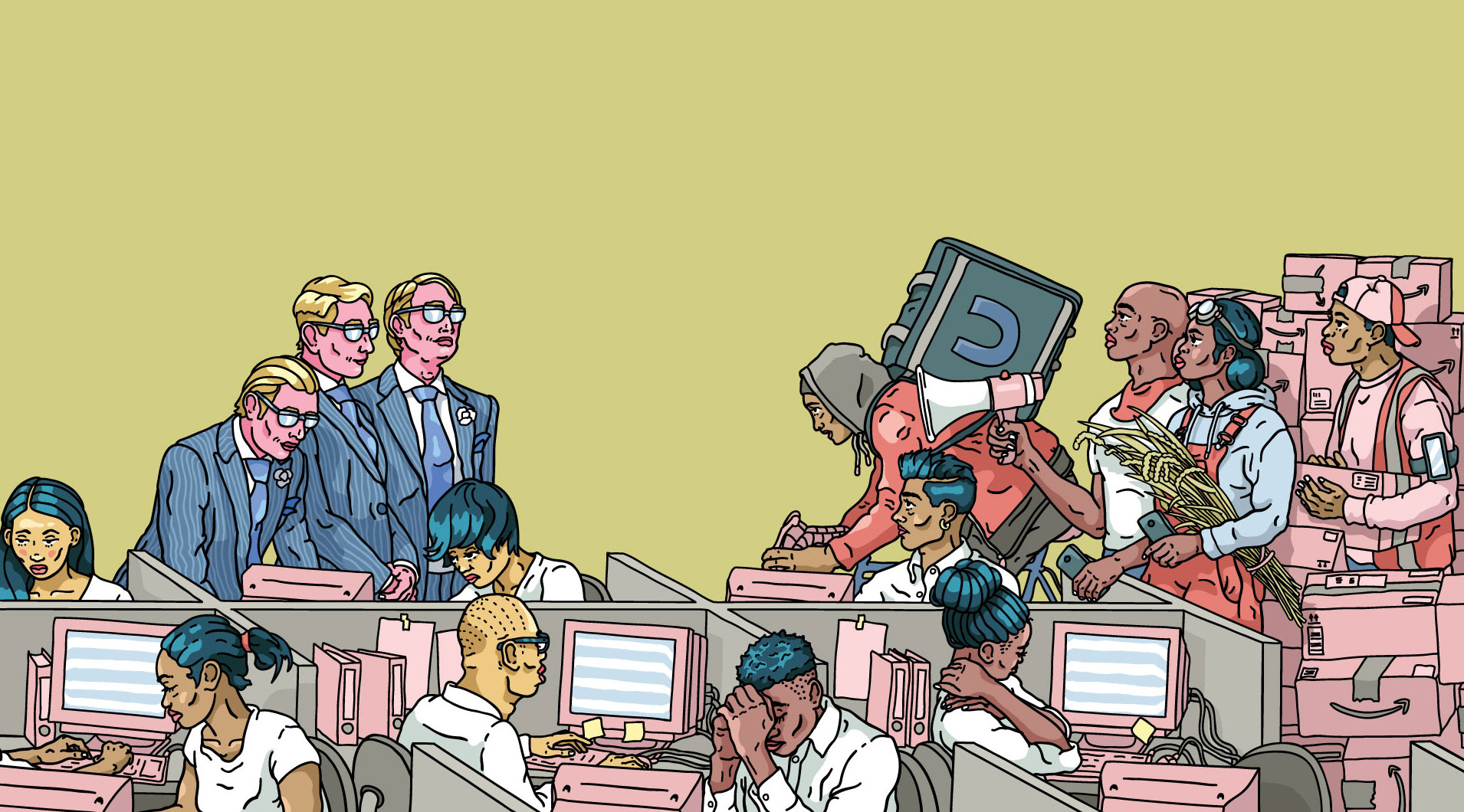Building a global movement
More and more people recognise the profound impacts of digitalisation and are looking for the language and tools to engage on the issue, particularly as it relates to their own struggles, from food sovereignty to workers’ rights to gender equality. TNI supports activists, scholars, organisations and movements in developing the knowledge and strategies to counter capitalist power in the digital age. A new six-week course on digital capitalism drew 714 enthusiastic participants from 66 countries worldwide. In lectures and discussion featuring leading global experts, we tackled vital issues, such as the monopoly power of Big Tech, digital colonialism, and digitalisation’s role in state systems of repression. We also explored existing and emerging alternatives that contribute to a more socially and environmentally just digital world.
In cooperation with diverse allies, TNI is helping build a powerful movement for digital justice worldwide, including through the Global Digital Justice Forum, which now includes more than 34 organisations. The Forum brings together diverse movements, including sustainable development organisations, digital rights networks, feminist groups, corporate watchdogs, communication rights campaigners, trade unions and cooperatives. Together, we are calling for an equitable and inclusive digital society shaped by democratic, civil society participation. In 2024, the Forum’s collective advocacy focused on the Global Digital Compact, which was adopted at the UN Summit of the Future.
In the run-up to the Summit of the Future, the Global Digital Justice Forum provided textual input into consultations on the Global Digital Compact, highlighting the importance of strong human rights commitments, and the need for countries to be able to develop their own digital infrastructures and economies. At the same time, TNI and our allies in the People’s Working Group on Multistakeholderism urged decision-makers to reject corporate capture of global governance, and ensure a democratic and participatory multilateral approach to the Summit of the Future and UN processes generally. In several policy dialogues, co-organised with South Centre, TNI raised awareness among G77 delegates of the risks of corporate capture through multistakeholderism, and shared analysis and recommendations specific to the Global Digital Compact and the Pact for the Future, the Summit’s two outcome documents. These efforts, which built on our long-term work on the issue, helped prevent inclusion of multistakeholderism in the Summit’s Pact for the Future.
Throughout the year, we offered our perspective on the digital economy in diverse spaces. At Public Services International’s (PSI) Interamerican Regional Conference, held in Colombia, we spoke about digitalisation’s effect on the public sector and trade union responses, and contributed to the development of PSI’s new multi-year Regional Programme of Action. At the invitation of the Global Fund for a New Economy, we helped organise and develop the programme for the fund’s inaugural convening. Held in Mexico, the convening brought together nearly one hundred scholars, advocates, organisers, and technology experts to explore the global political economy of AI and digital technologies, and help build the agenda for new funding initiatives.
Digital justice, trade and AI
TNI is playing a crucial role in linking the struggle for digital justice with that of trade justice. An online training for trade justice activists and digital rights activists helped demystify digital trade issues for both groups and connect their agendas. In Brazil, TNI brought its expertise on digital trade to the members of REBRIP, a Brazilian network of unions, social movements, peasants, women’s groups, environmentalists and others whose aim is to influence international trade negotiations and regional integration processes. In Europe, we co-organised the European trade justice meeting in Brussels, where we contributed to a collective strategy on digital trade issues.
At the global level, TNI plays an active role in the Our World Is Not For Sale Network, which focuses on World Trade Organisation (WTO) issues. TNI has helped to bring emerging issues to the network’s agenda, including work on digital trade. A key issue in 2024 was the WTO e-commerce moratorium. TNI has denounced the moratorium for contributing to the monopoly power of global tech firms, and preventing Global South countries from generating revenue and preserving sovereignty over data. At the WTO ministerial in Abu Dhabi, TNI engaged with delegates and government representatives, and co-organised a side-event with the Digital Trade Alliance, where we emphasised that taxation of the digital economy is vital to ensure fairness in the digital economy. Our efforts contributed to growing opposition by Global South countries to the e-commerce moratorium.
TNI also raised awareness about the critical issue of AI. In various arenas, we highlighted the urgent need to protect workers in the digital economy and ensure a human-centred approach to AI. Among other things, we spoke about AI and digital trade at a conference organised by the Trade Union Confederation of the Americas, and at an event in Brazil organised by the Latin American organisation Derechos Digitales. At the invitation of the International Trade Union Congress (ITUC), we contributed to a conference of Labour 7, an important platform for trade unions from G7 countries. In a session entitled ‘Creating the Future of Work We Want: Humans Leading AI and the Role of Unions’, we discussed priorities and challenges of workers and trade unions with respect to AI, workers’ rights and democracy. Our efforts contributed to increased support, including from G7 Labour and Employment Ministers, for a human-centred approach to the adoption of AI in the world of work.

